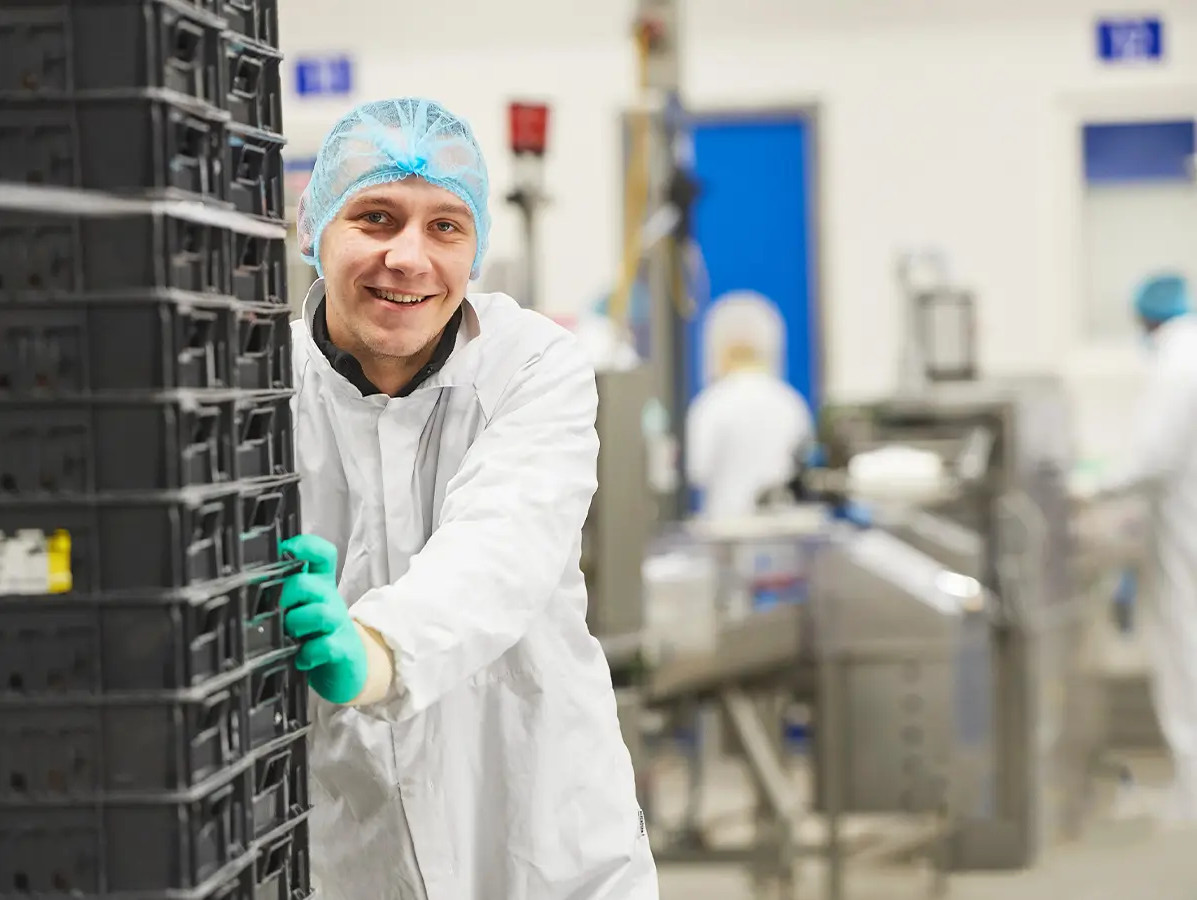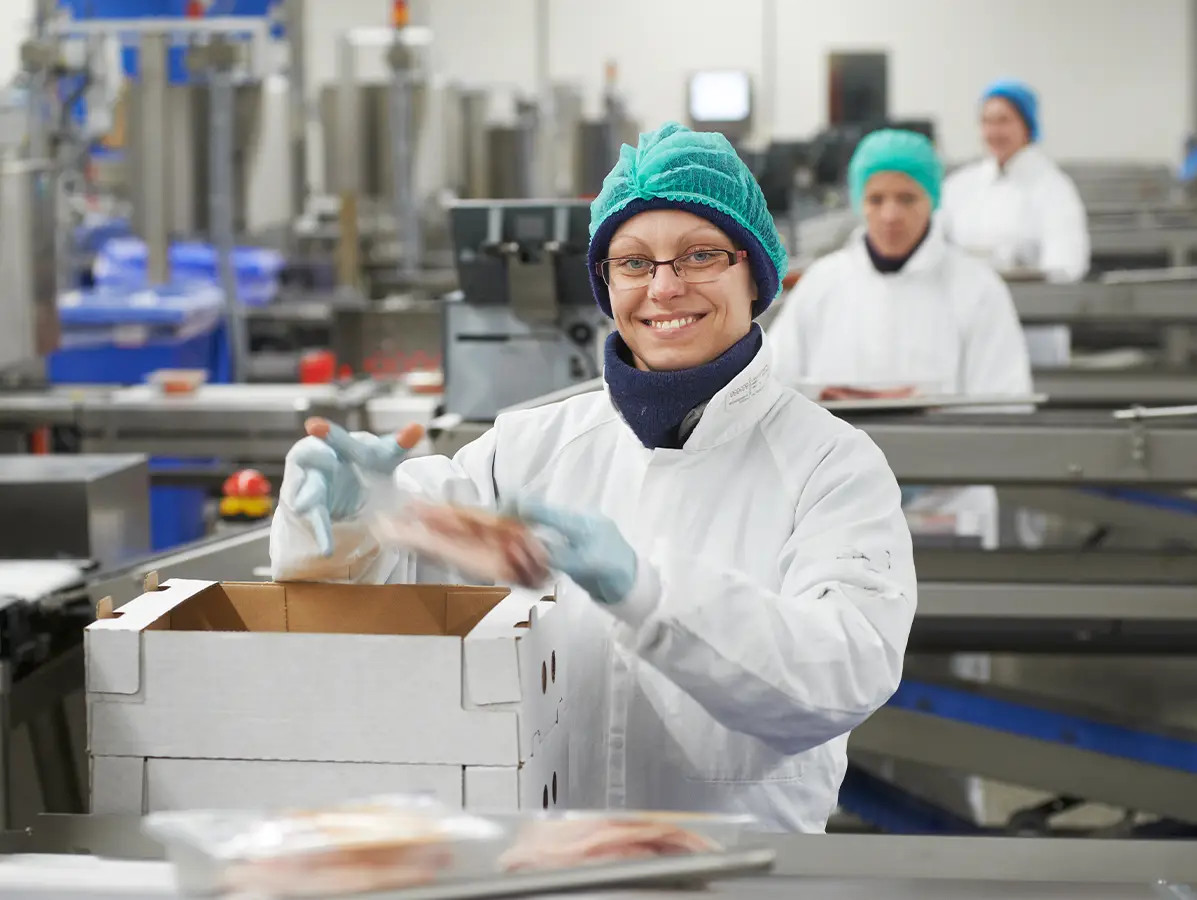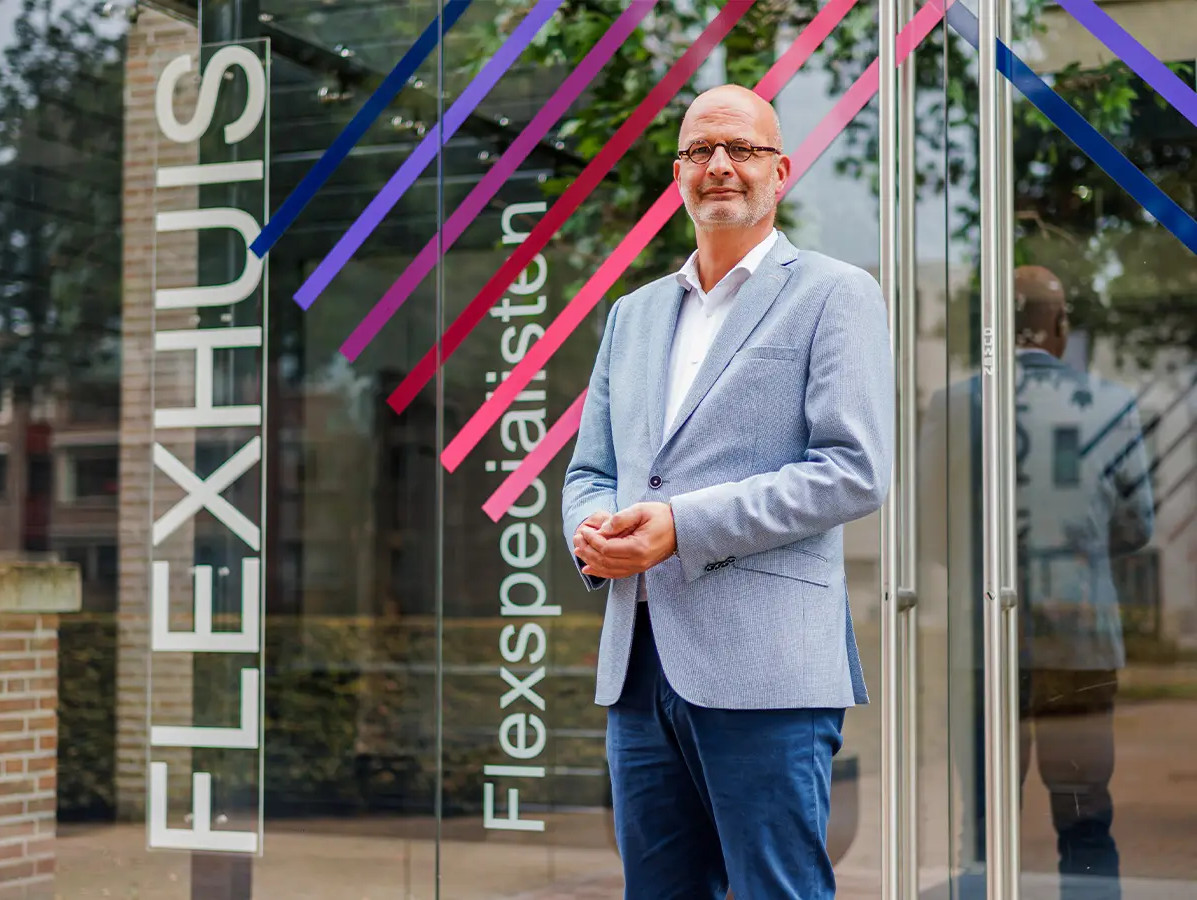
Van Loon Group is a food company specialising in meat and convenience products such as soups, sauces and ready meals. Like many companies in the food industry, they deal with alternating quiet and peak periods in production. But finding people to fill those gaps is becoming an increasing challenge. So how do they manage?
“As we approach the weekend, when most people do their grocery shopping, things pick up at almost every location. During barbecue season it’s all hands on deck. And the same goes for holidays like Easter and Christmas—we need to scale up significantly.” Speaking is Diana Crott, HR Manager at Van Loon Group. Joining her at the table are Birgit Toonen, Business Development Specialist, and Gerben Ballast, COO of Flexspecialisten. This staffing agency provides flexible personnel for sectors such as E-commerce, Food, Logistics, Non-food, and Retail. The three labor market experts discuss trends, developments and the pressing challenges around workforce availability.
What started as a small butcher’s shop behind the Genneper Watermill in Brabant, Van Loon Group has grown over the past fifty years into a major supplier for both foodservice and retail. These days, it is no longer just meat products they produce; meat alternatives, soups, sauces, fresh ready meals and meal components als find their way to the market under strong brand names like Best Star Meat, Brandenburg Culinair, Enkco, Bonfait and Maître. “Factory work is hardly done by Dutch workers anymore, and the meat sector doesn’t exactly have a sexy image. So we mainly rely on migrant workers,” Diana explains. From the company’s head office in Son, she and her team manage central HR activities, including relations with staffing agencies like Flexspecialisten. This agency supplies temporary workers for Van Loon’s three largest locations: Beilen, Son and Best. In Beilen, there's even an in-house setup, meaning the agency not only takes care of all the temporary workers there and guide them to their workplace, but also handles the scheduling. Flexspecialisten is one of three preferred suppliers. “We have 1,000 temporary workers on-site every day,” Diana notes. “You simply can’t rely on just one agency—that would be far too risky.”
Labor shortages are a general trend across the labor market. But it’s not the only issue right now. Gerben explains: “There’s a political push for the Netherlands to solve its labor shortages domestically. But that’s just not realistic. There are roughly 800,000 to 900,000 labor migrants working in the Netherlands—and they’re absolutely essential. We sometimes joke: if staffing agencies like ours pulled the plug for even two days, the country would grind to a halt. Supermarket shelves would stay empty, meat, fish and vegetables wouldn’t get processed, and logistics would come to a standstill. Meanwhile, it’s becoming more difficult to attract and retain migrant workers. “We have to do more: get them here, find them housing, and take care of the back office and administration. On top of that, the legal minimum wage has risen sharply in recent years. Due to these developments temp workers are becoming unaffordable—and with them the products and services for which they are needed.”

A major shift has been the introduction of legal frameworks around proper care and accommodation for migrant workers. Birgit adds: “It used to be common for a worker to arrive in the Netherlands without knowing where they'd be placed. That’s no longer acceptable. Due to income guarantees, we’re required to pay them 40 hours at minimum wage for the first 9 weeks—no exceptions. That’s a great development, but it also means we need to sit down with clients and ask: can you guarantee 40 hours of work? Migrant workers have also become more selective. They want to know in advance where they’ll work, what kind of tasks they’ll perform, how much they’ll earn, what the surroundings are like, and where they’ll be living. We try to give them the clearest picture possible. From the moment they’re hired, we arrange everything: transport to the Netherlands, accommodation, appointments with the municipality to get their citizen service number, health insurance, and benefits. Providing clear information and good support is key if you want people to stay longer.”
But it’s not just the laws that have changed—so has the composition of the workforce. All three agree: this creates a wide range of new challenges. Birgit: “Fifteen years ago, you’d still see Dutch workers doing tasks like boning or trimming. You hardly see that anymore. For a long time, most of our migrant workers came from Poland. Now they’re more likely to come from Romania, Bulgaria, Latvia and Lithuania. We’ve opened recruitment offices in Romania and Lithuania, as well as in Poland. We work with our own recruiters there.”
Diana adds: “With more nationalities in the workplace, new language and cultural challenges come into play. It requires our teams and organisation to be more agile.”
“To a certain extent, yes,” Birgit acknowledges. “But even highly automated distribution centers still need people. And with more of those centers popping up, the overall demand for workers is actually increasing.”
Gerben estimates that over the next five years, mechanisation and automation could reduce the need for workers on the production floor by 20 to 30%. “But the remaining workforce needs to be more technically skilled. They must be able to work with all the machines and robots. This is partly why our customers want English-speaking staff, people who can read and understand the machine instructions and food safety protocols. That’s why our clients are asking for English-speaking staff. And we’re addressing this by offering training—through e-learning and hands-on assignments.”
Diana adds: “We have a dedicated improvement and project team focused on robotics and automation. It’s an ongoing process. But as Birgit rightly says, people will always be needed. We can’t automate everything. For instance, making barbecue skewers or other small-batch seasonal products is a lot harder to automate than, say, a high-volume minced meat line that runs at full capacity all year round.”
Training is also essential, she stresses. “Anyone who wants to work in our production facilities must first complete several training sessions, including food safety and hygiene. Once they’ve started, there are opportunities for growth all the way up to team leader level. That’s what our Van Loon Campus is for. We also regularly measure employee satisfaction and act on it. One of the key pillars of our HR strategy is investing in motivated, engaged people—and that applies to both our direct employees and our temps.”

Gerben Ballast
“Rightly so,” says Diana. “We welcome it. Any malpractice needs to be addressed.” She represents Van Loon Group on the Taskforce for Migrant Housing, as the company is committed to improving housing for international workers. “It’s frustrating that the entire meat sector gets judged by the behavior of a few bad actors. Stricter legislation will help shift that perception. I hope we’ll start seeing those effects soon.”
Gerben adds: “Some staffing agencies are still finding creative ways to circumvent the rules. We call them ‘cowboys’—operating in grey areas that might just be legal but don’t sit right. So yes, we also welcome the stricter enforcement from The Hague, tackling these kinds of malpractices.”
“At Van Loon Group, we want everything to be properly arranged,” Diana emphasizes. “That’s why we only work with certified agencies that are ABU members and meet all the conditions. If they don’t, we don’t work with them.”
The General Association of Temporary Employment Agencies (ABU), of which Flexspecialisten is a member, requires that agencies offering housing for migrant workers meet the housing standards set out in the Collective Labour Agreement for Temporary Workers. The ABU tests the application of these housing standards through the housing certificate of the SNF (Stichting Normering Flexwonen). These standards deal with issues like the safety of the accommodation, its hygiene, the maximum number of people allowed to stay there, and number of showers. SNF maintains a register of companies that demonstrably meet the housing standards in the collective bargaining agreement. Companies in the SNF register are audited annually. More and more municipalities are making SNF certification a prerequisite for granting permits.
Since January 1, 2025, a new system has come into effect: the Price-Quality System (PKS). It provides transparency in housing costs charged to migrant workers, specifically that no more is charged than is qualitatively justified. PKS sets additional standards on a number of aspects of housing compared to SNF, especially in terms of privacy and space. “PKS shows that we often exceed the SNF requirements—and never fall below them,” says Birgit. “We believe that if you take good care of people, they’re more likely to stay. That’s why we focus on their development, monitoring and supporting them closely.”

Birgit Toonen
Birgit and Gerben both believe the length of stay is closely linked to the care and attention given to the worker. “What’s essential is strong collaboration and communication between the worker, the client and us as employer. The client handles day-to-day supervision, but we’re the employer. So we’re always working in a triangle—we often call it our ‘triangle relationship’,” Birgit laughs.
“Our partnership is very close,” Diana agrees. “We set clear agreements and KPIs, and we’re transparent—especially when it comes to wage calculations. That’s a must, because a temp should earn exactly the same as an in-house employee in the same role.”
“We all share the same goal: we all strive for a successful cooperation,” Gerben adds. “Take sick leave, for example. Is someone sick with the flu, or is there more to it? We also have a duty of care. That’s actually one of the positive effects of the new legislation—it forces us to take a closer, more personal look at our people.”
They all laugh: “Absolutely!” comes the unanimous reply.
Birgit: “We build long-term relationships and collaborate closely with our clients. That allows us to be true sparring partners—which I love. What’s frustrating is the constant shift in regulations.”
“Yes, the labor market and the political decisions around it are becoming tougher,” Gerben acknowledges. “But honestly, that’s also what keeps the job dynamic. That dynamism is part of the challenge—it forces us to stay sharp and keep finding new solutions.”
Diana wraps it up with enthusiasm: “This company is always on the move. We’ve secured a solid position in the market. When you provide food for 8 million plates a day, you’re playing a significant role in society! Like you, I thrive on the pace and energy this job brings.”
Photos: ©Van Assendelft Fotografie
Source: Vakblad Voedingsindustrie 2025